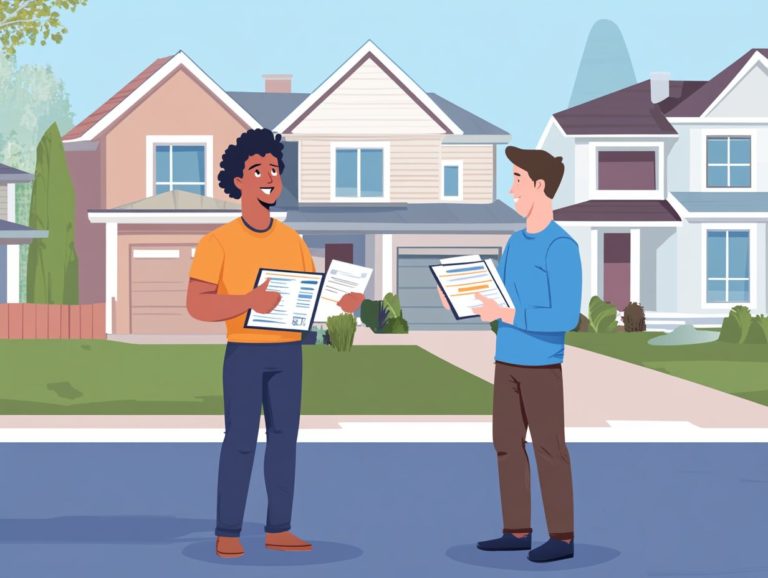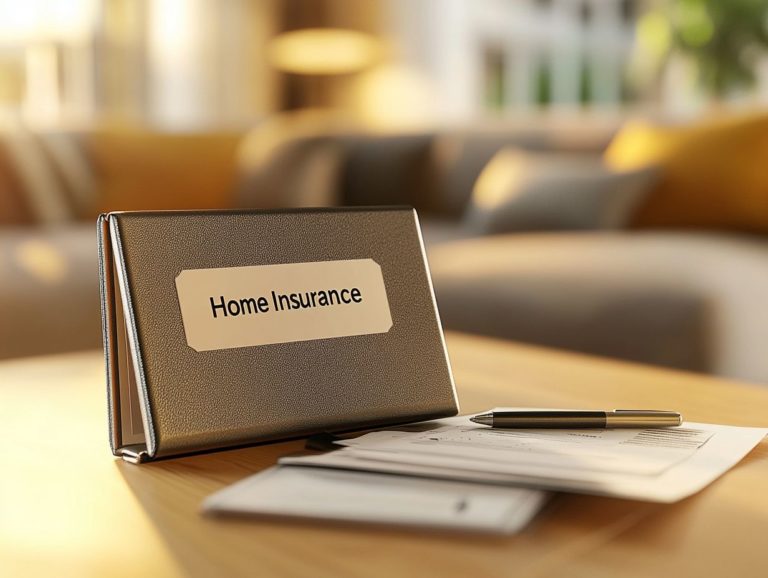Can You Get Home Insurance with Bad Credit?
Navigating the world of home insurance can be quite the challenge, especially when your credit score leaves much to be desired. Many homeowners are unaware of just how significantly their credit score can affect their insurance rates.
This guide delves into the complex relationship between credit scores and home insurance, providing you with valuable insights on how to secure coverage, even if your credit history isn’t perfect.
You ll discover alternative options, practical steps to boost your credit, and other factors that can influence your insurance rates.
Whether you re a first-time buyer or seeking ways to save on your current policy, this guide is your key to unlocking the best home insurance options.
Contents
- Key Takeaways:
- Understanding Credit Scores and Home Insurance
- Options for Obtaining Home Insurance with Bad Credit
- Improving Your Credit Score for Better Home Insurance Rates
- Factors that Affect Home Insurance Rates
- Preguntas Frecuentes
- Se puede obtener un seguro de vivienda con mal cr dito?
- C mo afecta el mal cr dito al seguro de vivienda?
- Qu factores consideran las compa as de seguros al asegurar a alguien con mal cr dito?
- Puedo mejorar mis posibilidades de obtener un seguro de vivienda con mal cr dito?
- Existen opciones alternativas para obtener un seguro de vivienda con mal cr dito?
- Puede cancelarse mi seguro de vivienda si mi puntaje de cr dito mejora?
Key Takeaways:

Having bad credit can affect your home insurance rates. However, can you get home insurance with bad credit? Non-standard insurance companies and alternative options may offer home insurance to those with poor credit. Improving your credit score can lead to better home insurance rates.
Understanding Credit Scores and Home Insurance
Understanding the connection between credit scores and homeowners insurance is vital for you as a homeowner. Many insurance companies consider credit history a key risk factor when setting insurance premiums.
A lower credit score can translate to higher insurance costs. It’s essential for you to recognize how your financial behavior impacts your home insurance rates and coverage options.
Your credit score can significantly affect the insurance products available to you and the average premium you can expect to pay, regardless of whether you reside in California, Maryland, or Massachusetts.
How Credit Scores Affect Home Insurance Rates
Credit scores play a pivotal role in shaping your home insurance rates. Insurance companies often rely on these scores to gauge the likelihood of claims and potential premium hikes.
By analyzing your creditworthiness, insurers gain valuable insights into your risk profile, leading to more informed underwriting decisions.
While credit scores reflect your borrowing history, insurance scores provide a tailored perspective specifically designed to evaluate insurance risks.
On average, individuals with high credit scores can enjoy premiums that are nearly 30% lower than those in the lower credit tiers. For example, someone with an excellent credit score might pay around $800 annually for coverage, while a policyholder with a poor credit score could face rates exceeding $1,200.
Options for Obtaining Home Insurance with Bad Credit
If you have bad credit, finding homeowners insurance can feel daunting, but don’t worry! There are options to secure the coverage you need.
While prominent insurance companies may have strict requirements, look into non-standard insurance providers and programs like the FAIR plan, which provides insurance for high-risk homeowners.
By understanding the range of available coverage options, you can navigate the landscape of insurance and find the necessary protection for your personal property.
Working with Non-Standard Insurance Companies

Working with non-standard insurance companies can be a savvy choice for homeowners with less-than-stellar credit. These insurers typically offer customized homeowners insurance solutions that take into account a broader range of risk factors, rather than just credit scores.
By using more flexible underwriting criteria, they can evaluate risks based on various elements, such as the condition of your property, its location, and your individual claims history. This approach opens the door for many individuals who might otherwise struggle to find coverage.
The claims process with non-standard insurers can vary widely; some may deliver a streamlined experience, while others could have more intricate requirements. It s crucial for you to thoroughly examine the types of coverage available, as well as any potential drawbacks like higher premiums or limited options.
Ready to secure your home? Start exploring your options today!
Alternative Insurance Options
Alternative insurance options, such as specialty homeowners insurance products or policies from smaller insurance companies, can provide you with essential coverage, especially if you have bad credit.
These alternatives are often designed specifically for individuals who might be considered high-risk by standard insurance companies, allowing you to access the crucial protection your home deserves.
It s wise for you to explore various regional providers, as they may offer more customized plans tailored to your unique situation. Be sure to compare not only the premiums but also the coverage limits and deductibles associated with each policy.
This careful evaluation gives you the power to select an insurance plan that adequately meets your needs and budget, ultimately securing your property without stretching your finances.
Improving Your Credit Score for Better Home Insurance Rates
Enhancing your credit score is one of the best ways to secure better homeowners insurance rates. A higher credit score can translate to lower premiums and a broader array of coverage options.
By maintaining a strong credit history, you not only bolster your financial capabilities but also influence the types of insurance products available to you.
Simple actions, such as reducing credit utilization and ensuring timely payments, can greatly elevate your credit score and overall financial standing. This makes it more manageable to fulfill your policy obligations.
Steps to Take to Improve Your Credit Score
To enhance your credit score, begin by regularly reviewing your credit report for any errors and promptly addressing discrepancies that could negatively impact your credit history. Homeowners can take several actionable steps to elevate their financial standing.
- First, paying down existing debts not only reduces your overall debt-to-income ratio, which compares your total monthly debt payments to your income, but also showcases your responsible management something lenders truly appreciate.
- Making timely payments for bills and loans can significantly elevate your creditworthiness, as payment history is a critical component of credit scoring.
- Understanding how credit checks impact your score is also important; each inquiry can slightly lower your score, so limiting applications for new credit can be beneficial.
By implementing these practices, you foster better financial health, gain access to more favorable mortgage rates, and unlock improved insurance options. Ultimately, this paves the way for a more secure financial future.
Factors that Affect Home Insurance Rates

Home insurance rates are shaped by a multitude of factors that you should consider. Your claims history plays a crucial role in the risk assessment, while the value of your personal property and the types of coverage you choose also significantly impact your premiums.
Besides Credit Score
While your credit score is certainly a significant factor that influences home insurance rates, it’s essential to recognize that several other risk factors can also impact the overall cost of your homeowners insurance.
For instance, the likelihood of claims plays a crucial role; if your home is situated in an area prone to natural disasters or high crime rates, you could end up paying much more! The condition of your home matters too well-maintained properties generally attract lower costs, while those in need of repairs may signal higher risk to insurers.
Additionally, having security features like alarm systems and deadbolts can often lead to discounts on your premiums. As a homeowner, it’s important to contemplate how these various elements not only affect your policy rates but can also influence your coverage limits.
In some cases, this may even necessitate adjustments in your overall insurance strategy to ensure you have adequate protection.
Preguntas Frecuentes
Se puede obtener un seguro de vivienda con mal cr dito?
S , es posible obtener un seguro de vivienda con mal cr dito, pero puede ser m s dif cil y costoso.
Start comparing your options today to find the best insurance coverage for your needs!
C mo afecta el mal cr dito al seguro de vivienda?

El mal cr dito afecta su seguro de vivienda de varias maneras. Puede resultar en costos m s altos o en opciones de cobertura limitadas.
Qu factores consideran las compa as de seguros al asegurar a alguien con mal cr dito?
Las compa as de seguros observan su puntaje de cr dito, su historial de pagos y las deudas pendientes. Estos factores indican su responsabilidad financiera.
Puedo mejorar mis posibilidades de obtener un seguro de vivienda con mal cr dito?
S ! Puede mejorar sus posibilidades tomando medidas para aumentar su puntaje de cr dito. Pague sus cuentas a tiempo y reduzca sus deudas pendientes.
Existen opciones alternativas para obtener un seguro de vivienda con mal cr dito?
Si el seguro tradicional no es una opci n, considere compa as de seguros no est ndar o de alto riesgo. Tenga en cuenta que estos seguros pueden tener costos m s altos y opciones limitadas.
Puede cancelarse mi seguro de vivienda si mi puntaje de cr dito mejora?
Una vez que tenga un seguro de vivienda, su puntaje de cr dito no afectar la cobertura actual. Sin embargo, si mejora significativamente, solicite una revisi n de su p liza. Esto puede llevar a una prima m s baja o mejor cobertura.






